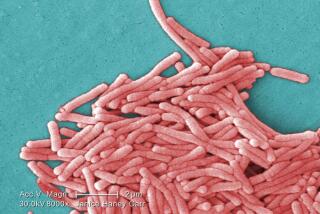Families Question How Dead Teens Were Infected
- Share via
SALEM, Ohio — The families of two teenagers who died from a meningitis-related disease say their children were not friends and they doubt official reports that they could have passed the infection by sharing a water bottle.
Jonathan Stauffer, 15, died May 26, and a Beloit West Branch High School classmate, Kelly Coblentz, also 15, died two days later. Both had attended a school picnic, and authorities said the infection could have been passed by sharing a drink.
But Stauffer’s brother Chris, 18, said, “Jon and Kelly didn’t know each other.”
James and Lynn Coblentz said their daughter was very cautious about infection since suffering viral meningitis two years ago.
“If she ever knew anyone drank out of her glass she would get rid of it,” Lynn Coblentz said Wednesday. “She was very adamant about not drinking after anyone.”
The two teens died of meningococcemia, a blood infection caused by the Neisseria meningitidis bacterium. The same bacterium also causes meningitis, a disease of the brain.
The germs are spread through saliva by such means as sharing a glass or fork. Symptoms include high fever, headache, stiff neck, confusion, nausea, vomiting and exhaustion.
Health officials say they do not yet know how the students were infected.
On Wednesday, the federal Centers for Disease Control and Prevention confirmed that a third teen who fell ill, Christin VanCamp, 18, had the same type of bacterium that infected Jonathan and Kelly, though it is not certain the germs are from the same source. VanCamp goes to a high school about 15 miles from the school in Alliance that the other two teens attended.
She remains at Children’s Hospital Medical Center of Akron. Her condition has been upgraded to stable, the hospital said Thursday.
State health officials hope to vaccinate 5,800 students and the staffs of five area high schools and one middle school against the bacterium on Friday.
Authorities previously distributed antibiotics to 37,000 residents of several northeast Ohio communities and decided that only those who may have come in direct contact with the infected students needed shots.
Bishop Thomas Tobin of the Youngstown Catholic Diocese ordered eight parishes in the affected area to temporarily stop distributing consecrated wine at communion to prevent any chance of transmitting the germ. The order wasn’t prompted by any CDC recommendation, the diocese said.
Tobin said the CDC has regularly reviewed the practice of sharing the communion cup and the practice has little health risk if the rim is wiped after each use.
More to Read
Sign up for Essential California
The most important California stories and recommendations in your inbox every morning.
You may occasionally receive promotional content from the Los Angeles Times.













